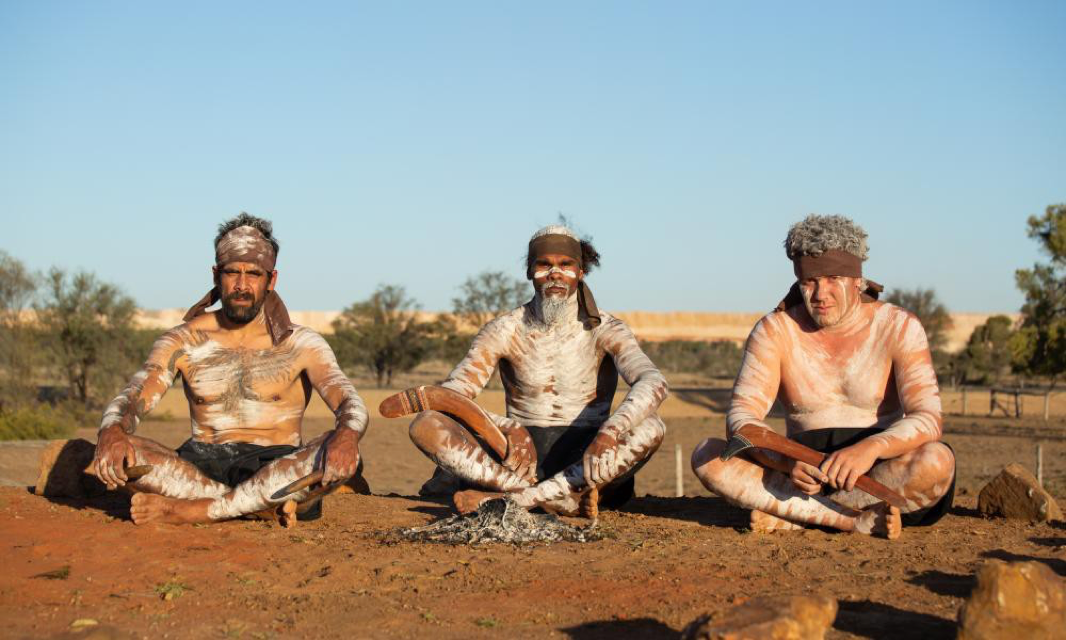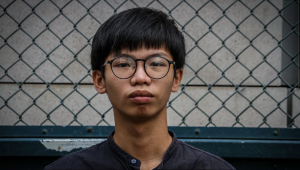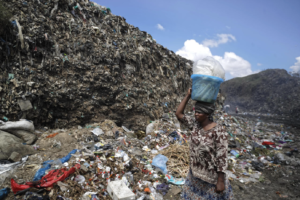Miner says group is ‘trespassing’ but police have acknowledged their cultural rights under human rights act
Queensland police have told a group of First Nations people occupying the site of Adani’s Carmichael coalmine for the past five weeks that they have no intention of removing them from the area “at this time”.
The group of Wangan and Jagalingou traditional owners opposed to the coalmine project began an ongoing cultural ceremony within the boundary of Adani’s mining lease in late August.
Adani says the group are “anti-fossil fuel activists” who are “trespassing under the guise of traditional activity”.
Police say in a statement their investigations and negotiations are “ongoing”. But officers at the mine site have told the group of traditional owners that they recognise their cultural rights to conduct ceremony, under provisions of the 2019 Queensland Human Rights Act.
The situation potentially paves the way for an ongoing standoff at the mine – where the Queensland government has extinguished native title – between Adani and Indigenous protesters.
“We understand that your connection to culture is disappearing and you don’t want to lose that,” a police officer says in an audio recording shared with Guardian Australia.
“At the moment you guys are here and you’re practising culture, and part of that under the Human Rights Act is for that to be practised and shared.
“We have no intention at this time is to come in [and remove you], our intention is to support you through that [and] mediate the two groups.
“Initially we were here [because Adani] were making a complaint against you guys being here, at this time that is not the case. Please note we are not the enforcers here. If they want to do something they’ve got their legal avenues they need to take.”
In a formal statement, police said they were still investigating Adani’s complaint.
“A police command team, including police negotiators and police liaison officers have been in negotiations with all stakeholders involved,” the statement said.
“This includes people at the camp, mining employees and executives from government departments with a view to obtain a peaceful and non-disruptive resolution into the future.”
Earlier this year, the Queensland police service issued a “statement of regret” to W&J man Adrian Burragubba, who complained to the Queensland Human Rights Commission about his removal from a pastoral lease area near the mine site.
Coedie McAvoy, a Wangan and Jagalingou man and the son of Burragubba, said the group was “practising our culture and performing traditional ceremony on our home lands, the place of our ancestors”.
“The police came in with the understanding that we are practising our human rights. They accepted that we have human rights pursuant to section 28 of the Queensland Human Rights Act and they quoted that section knowing that we are asserting that right. It’s phenomenal that they actually understand the rights that we are asserting.
“This has been a long time coming in the history of my family, going back to the separation and removal from country.
“For [police] to come back now as representatives of the Queensland government, and accept that we are asserting our right to practise our culture is a great feeling for us.”
“We are the first Aboriginal people to use the Human Rights Act to defend our cultural rights and we are going to keep doing it.”
The miner has a formal land-use agreement with the W&J people. That agreement is opposed by some traditional owners.
Earlier this year, the rating agency Moody’s cited ongoing Indigenous opposition to the Adani project while warning miners their credit ratings could be downgraded if they did not maintain good relationships with traditional owners.
“While in this case [Adani] was ultimately given exclusive possession to the land and granted approvals for its mine, the inability to maintain social licence to operate with some members of the local Indigenous community adds another layer of risk to a project that was already facing challenges in maintaining social licence to operate with the broader community because of environment concerns,” the Moodys report said.
“This may also add further complexity to a project where some participants from the investment community have signalled an unwillingness to provide funding.”
Adani said the group at the mine site were “anti-fossil fuel activists” who were unlawfully trespassing.
“The complaints are now with Queensland Police Service to appropriately deal with,” the miner said.
“We are supportive of our traditional owners undertaking cultural practices and ceremonies on their traditional lands and as a responsible landholder we will continue to ensure that when people do wish to access our land properties, they are able to do so in a planned, safe, and respectful manner
“However, we won’t tolerate criminal activity on our mining lease, nor anti-fossil fuel activist group Frontline Action on Coal cloaking their anti-coal protest camp and trespassing under the guise of traditional activity.”




